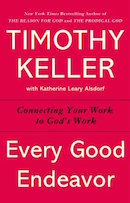Simplicity at Work: A Single Eye
Blog / Produced by The High Calling
Shortly out of college, overwhelmed by the foreignness of life-after-school, I began to try to simplify my life. Books about simple living were everywhere, and I devoured them. In all my reading about simplicity, I read only one book, Richard Foster’s Freedom of Simplicity: Finding Harmony in a Complex World, that didn’t start with stuff and schedules but rather started with simplicity as a way of being. I didn’t like that book. I didn’t want a way of being; I wanted a to-do list.
So I did what the other books suggested. I minimized my clothing, books, make-up, medicine, kitchen gear, furniture, anything I could live without. I minimized my activities and interests. I minimized my expenses. I thought minimizing my needs and desires and the complexity of my life was the path to a simple life, to the Good Life. But what I ended up with was a minimal life, devoid of beauty and joy.
What I have slowly and painfully learned is that simplicity, at least in its Christian incarnation, is not about stuff. It’s not about schedules. It’s about simple-ness. To be simple is to be single, to have a singular focus, the single eye that Jesus talks about in Matthew 6.
The opposite of simplicity isn’t, as I thought, complexity. It’s duplicity.
Duplicity, of course, means lying or deception. But it’s also a double vision, the opposite of the single eye Jesus told us to have. It’s a way of being that tries to have too many foci. We cannot serve two masters, and to think we can is to deceive ourselves.
If our eye is single, Jesus says, if we are focused, first and foremost, on him and his priorities, our whole being will be full of light—his light shining clarity on everything else we see. But if our eye is double, we are blind. We may think we see the light—as I did when I was busily giving away my stuff and saying no to almost everything—but we don’t. We are blinded by our duplicity.
How, then, do we move from duplicity to simplicity?
I have found it helpful to have prayer triggers—lots of them—to remind me to turn my attention back to Jesus. Every time I wash my hands or throw a load of clothes in the washer or stand at my kitchen sink, I pray. This did not happen overnight. It took months and years of practice and failure and trying again, to achieve this habit, this way of being. Now, I am practicing the daily offices of the church, attempting (and failing) to stop seven times in the course of my day to pray for five minutes. It will take a long time for this habit to take root. But this is how I live into simplicity, by constantly turning my eyes to Jesus, asking to see this situation, this person, this problem, with His eyes, and seeking to do as He would do.
Richard Foster was right. Simplicity is a way of being in the world. It’s a practice, not of shedding our stuff or saying no (though those things might come about as a result of simplicity), but of keeping our eyes—both of them—on Jesus.
“I came that they may have life, and have it abundantly.” –John 10:10
Simplicity at Work
In our complicated, 21st century, high-tech, high-speed world, people have begun to crave a simpler approach to life and work. In the series Simplicity at Work, The High Calling explores simplicity in the places we work and the ways we work; and, perhaps more subtly, we want to explore simplicity at work in us through a variety of stories that reveal ways people find freedom and success when they simplify. Join us for Bible reflections, featured articles, and discussion. Invite your colleagues to do the same.
Image by Marty Hadding. Used with permission. Sourced via Flickr.





